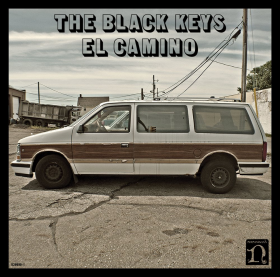By Nick Ubels (The Cascade) – Email
Print Edition: January 11, 2012
 The Black Keys’ 11 year career arc is an admirably tenacious one, consisting of gradual success to match the band’s developing talent and diverse musical palette. Midwest tour stops with only a handful of curious concert-goers the first time around would boast an audience of 20 the following year, maybe 50 the year after that, and so on. It’s something of a rarity these days to see a band devote so much time to earning a breakthrough record, like the Keys’ 2009 smash, Brothers. But drummer Patrick Carney and guitarist/vocalist Dan Auerbach’s long-haul dedication to their craft has paid dividends on their last two records.
The Black Keys’ 11 year career arc is an admirably tenacious one, consisting of gradual success to match the band’s developing talent and diverse musical palette. Midwest tour stops with only a handful of curious concert-goers the first time around would boast an audience of 20 the following year, maybe 50 the year after that, and so on. It’s something of a rarity these days to see a band devote so much time to earning a breakthrough record, like the Keys’ 2009 smash, Brothers. But drummer Patrick Carney and guitarist/vocalist Dan Auerbach’s long-haul dedication to their craft has paid dividends on their last two records.
The Akron, Ohio duo has come a long way from their roots as post-millennial Luddite blues punks recording scrappy and soulful eight-track albums for Fat Possum Records in Carney’s basement and abandoned rubber factories between summers spent landscaping to foot the bill. While the deft, maximal lo-fi of their early albums, Thickfreakness and Rubber Factory in particular, received due recognition from critics, the band’s stubborn adherence to nostalgic, stripped-down blues-rock started to wear thin by the release of the band’s most inconsistent record, Magic Potion, in 2006. Two years later, the band formed an unlikely but fruitful alliance with hip hop producer Danger Mouse who helped the Keys dramatically increase their generic range. The collaboration has yielded three albums so far: Attack & Release, Brothers, and El Camino. This trilogy of records has seen The Black Keys broaden and subsequently refine their approach to best play to their strengths, allowing a greater degree of creative freedom than their early blues-heavy records.
Released in early December, El Camino is a lot more focused and concise than its predecessor, Brothers. Instead of a sprawling (or bloated, depending on your take) 15 tracks, the Keys have whittled it down to 11, no nonsense songs that embody a kind of self-consciously greasy party atmosphere. There are no ballads here, but a wide range of up-tempo tracks replete with chunky guitars and octave vocal harmonies that bring glam-rock touchstones like T. Rex to the fore. The musicianship is once-again top notch with Carney’s incessant, driving percussive style propelling Auerbach’s more meandering guitar lines and gruff-yet-sweet vocals. Camino’s hammy lyrics and garish instrumentation verge on self-parody, but undeniably hook-laden choruses and inventive vocal melodies help root these more theatrical elements in musical substance.
With El Camino, The Black Keys have created an album about the spectacle of rock and roll. It revels in the genre’s early ‘70s decadence; its clichés, excesses, pleasures, sexuality, and grit are all on display, but coated in a glitzy veneer. The whole thing is impossible to take at face value—one of the tracks is actually called “Gold on the Ceiling”—and I think that’s the point. How seriously should we take the supposedly universal narrative of rock and roll? The promise of sex, drugs and worldwide adoration should have died along Hendrix, Joplin and other members of the 27 Club who met their early demise by the end of the ‘60s. It’s telling that an album that ostensibly celebrates the high-flying rock and roll lifestyle prominently features the Keys’ beat-up van in which they spent the better part of the past decade tirelessly touring the country. There is a palpable distance between the sleepless, largely thankless, couch-surfing existence of a young band and the reality we are widely invited to believe by hacks like Nickelback (see their number one piece of shit single, “Rockstar”). Here, The Black Keys set out to debunk that fleeting myth, but celebrate the staying power of the music. In its own way, El Camino invokes the spirit of David Bowie’s Ziggy Stardust era. While some might complain about the album’s retreat from the supposed authenticity and more earnest, un-ironic soulfulness of The Black Keys’ earlier work, their latest offering demonstrates the wealth of inspiration at their disposal. They’re running circles around the complexity of their chart-topping peers.


